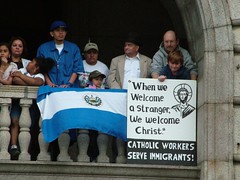 Carl Weaver has posted a video.
Carl Weaver has posted a video.
Co-organizer Kevin Ksen wrote a strong piece at Indymedia:
Sixty-seven local businesses and organizations are known to have closed on May 1st in Worcester; there are probably many more that did not get counted. The Worcester Public Schools estimate that 800-900 students stayed home. That was Worcester’s real vote on immigration reform; mom & pop small businesses in Main South, throughout Pleasant, the Valley and Grafton Hill deciding to close. Worcester’s event planners hesitated in supporting and promoting the boycott because they were worried about what might happen to immigrants that supported it. I remember Atty. Randy Feldman at the first meeting, tense and anxious as he compassionately stated, “We’d be responsible if something happened to someone.â€
It was exactly that caregiver, protective, social service world compassion to protect immigrants that carried many of the Coalition’s local planners away from even discussing the goals and strategy of the national boycott. The problem is though, that event planners weren’t the ones who would make Worcester’s decision about how to support the boycott. Immigrants from Westboro to Worcester’s west side who live with the threat of losing their jobs, losing their income, becoming separated from their families every single day were the people that would make that decision. It was they not event planners that knew the full costs of joining the boycott. Dishwashers, janitors and factory workers everywhere knew EXACTLY what they risked if they joined the boycott, and the bodegas, restaurants and other local business owners new EXACTLY how much money they were sacrificing by shuttering their stores. They decided the risk and sacrifice was worth the message that they as immigrants wanted to send.
Photo by Kevin Ksen/Indymedia.